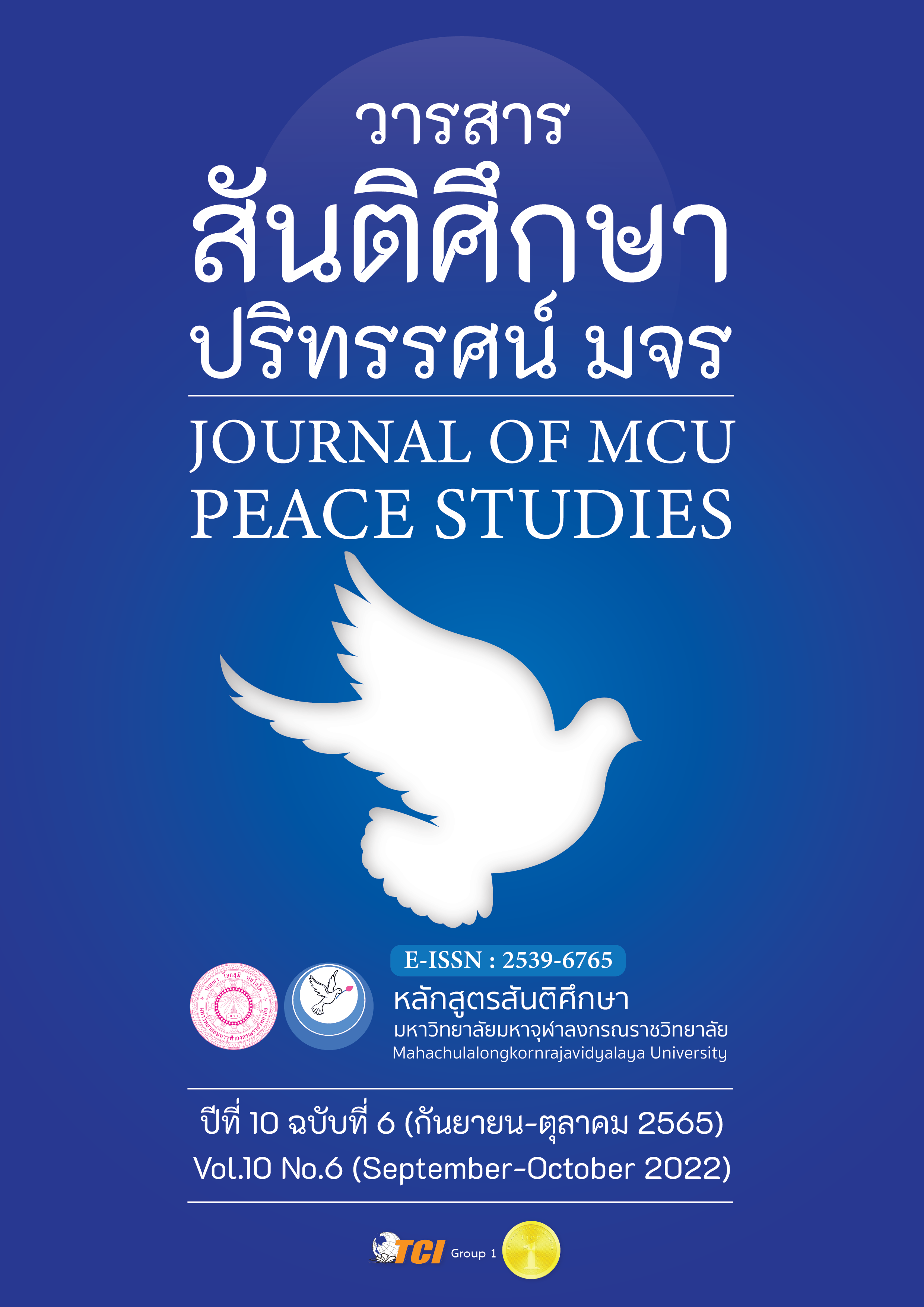มรรควิธีลดเว้นคำรุนแรงด้วยกระบวนการพัฒนาสื่อสร้างสรรค์ “นวัตกรรมบอร์ดเกม”
Main Article Content
บทคัดย่อ
บทความวิจัยนี้มีวัตถุประสงค์ คือ 1. เพื่อศึกษาและพัฒนามรรควิธีลดเว้นคำรุนแรงด้วยกระบวนการพัฒนาสื่อสร้างสรรค์ “นวัตกรรมบอร์ดเกม” และ 2. เพื่อศึกษาผลลัพธ์จากมรรควิธีลดเว้นคำรุนแรงด้วยกระบวนการพัฒนาสื่อสร้างสรรค์ “นวัตกรรมบอร์ดเกม” บทความวิจัยครั้งนี้เป็นการวิจัยเชิงกระบวนการสื่อสารแบบมีส่วนร่วมเชิงปฏิบัติการในการวิจัย กลุ่มตัวอย่างที่ใช้ในการศึกษาได้มาด้วยวิธีการสุ่มตัวอย่างแบบเจาะจง (Purposive Sampling) ได้แก่ (1) ทีมสนับสนุน ประกอบด้วย คณาจารย์สาขาวิชานิเทศศาสตร์ ตัวแทนจากมูลนิธิหญิงชายก้าวไกล และตัวแทนศิษย์เก่า และ (2) กลุ่มเป้าหมายหลัก ประกอบด้วย นักศึกษาสาขาวิชานิเทศศาสตร์ รหัส 60 ที่ลงเรียนในรายวิชาการรู้เท่าทันสื่อ ปีการศึกษา 2562 เครื่องมือที่ใช้ในการเก็บรวบรวมข้อมูลเป็นแบบสัมภาษณ์และแบบสนทนากลุ่ม วิเคราะห์ข้อมูลโดยการวิเคราะห์เนื้อหาและกระบวนการพัฒนานวัตกรรมบอร์ดเกม
ผลการวิจัยพบว่า 1. มรรควิธีลดเว้นคำรุนแรงด้วยกระบวนการพัฒนาสื่อสร้างสรรค์ “นวัตกรรมบอร์ดเกม” ดำเนินการตามกระบวนการพัฒนานวัตกรรม ได้แก่ การวิเคราะห์ข้อมูลกลุ่มเป้าหมาย การจัดกิจกรรมยกระดับความรู้ความเข้าใจในเรื่องของคำรุนแรงและการผลิตสื่อบอร์ดเกม การพัฒนาและผลิตสื่อ การทดลองเล่น และการประเมินผล/ถอดบทเรียน ในลักษณะของ ปัจจัยนำเข้า-กระบวนการ-ผลลัพธ์ และเน้นหลักการมีส่วนร่วมทั้งการเป็นผู้ออกแบบบอร์ดเกม ผู้เล่น และผู้ปรับปรุงและประเมินผลบอร์ดเกมของนักศึกษา 2. การมีส่วนร่วมในการออกแบบ สร้างสรรค์ และเล่นบอร์ดเกม ทำให้นักศึกษาสามารถลดการพูดคำรุนแรงลงได้และตระหนักในความสำคัญของการใช้สัมมาวาจามากยิ่งขึ้น โดยเฉพาะการพูดที่ก่อให้เกิดประโยชน์และการพูดด้วยเมตตาจิต
Article Details

อนุญาตภายใต้เงื่อนไข Creative Commons Attribution-NonCommercial-NoDerivatives 4.0 International License.
ทัศนะและความคิดเห็นที่ปรากฏในบทความในวารสาร ถือเป็นความรับผิดชอบของผู้เขียนบทความนั้น และไม่ถือเป็นทัศนะและความรับผิดชอบของกองบรรณาธิการ ยินยอมว่าบทความเป็นลิขสิทธิ์ของวารสาร
เอกสารอ้างอิง
Biggins, O. (2008). Creating Virtual Community in Online Games and Online Media Addiction Behavior of Youth in Bangkok. Bangkok: Damrongchaitham Foundation.
Chaiyanon, N.T. (2019). Boardgame for Change. Retrieved October 18, 2020, from http:// www.shorturl.at/ehGX6
Khemmanee, T. (2014). The Science of Teaching Knowledge to Organize an Effective Learning System. Bangkok: Dansutthara Printing.
Limpremwattana, V., & Thamwattann, K. (2017). Behavior of Playing Board Games and Component of Effective Factors for Playing Games of Teenagers in the Bangkok. Journal of Social Research, 40(2), 107-132.
Mostowfi, S., Mamaghani, N.K., & Khorramar, M. (2016). Designing Playful Learning by Using Educational Board Game for Children in the Age Range of 7-12: (A Case Study: Recycling and Waste Separation Education Board Game). International Journal of Environmental and Science Education, 11(12), 5453-5476.
Nakao, M. (2019). Special Series on “Effects of Board Games on Health Education and Promotion” Board Games as a Promising Tool for Health Promotion: A Review of Recent Literature. Bio Psycho Social Medicine, 13(5), 1-7.
Roonkaseam, N. (2018). The Integrated Teaching and Communication for Research Utilizing: The “Pomelo Model”. Area Based Development Research Journal, 10(3), 200-213.
Noda, S., Shirotsuki, K., & Nakao, M. (2019). The Effectiveness of Intervention with Board Games: A Systematic Review. Bio Psycho Social Medicine, 13(1), N.PAG. https://doi.org/10.1186/s13030-019-0164-1
Saechia, T. (2017). Using Strategy-Based Board Games to Develop the Critical Thinking Skills of 9th Grade Students in Large-Sized Schools of the Basic Education Commission of Pathum Thani. (Master’ Thesis). Faculty of Learning Sciences and Education. Thammasat university. Bangkok.
TCIJ. (2020). Thai Children at Risk, Being Bullied in the Classroom and the Online World. Retrieved April 14, 2021, from https://www.tcijthai.com/news/2020/19/scoop/9779
Thairath Online. (2014). “Department of Mental Health” Fear of Thai Society is Familiar with the Use of 'Harsh Words'. Retrieved April 14, 2021, from https://www.thairath.co.th/ content/397816
Viray, J. (2016). Engaging Students Through Board Games: Measuring Its Effectiveness on Academic Performance. International Journal of Scientific and Research Publications, 6(10), 5-7.


